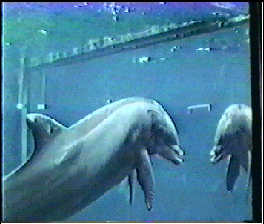Some elephants are self-aware, like dolphins and apes
 CREDIT: COURTESY OF JOSHUA PLOTNIK, FRANS DE WAAL, AND DIANA REISS
CREDIT: COURTESY OF JOSHUA PLOTNIK, FRANS DE WAAL, AND DIANA REISSThree videos. Must See.
Dr. Reiss did similar experiments with mirrors and dolphins, a few years ago. Dr. Reiss is a world leader in animal intelligence and communication research. Dr. Reiss is on the scientific board of Dr. Denise Herzing et al. Wild Dolphin Project, a collaborator of the free Seadragon software project for dolphin communication research.
http://news.yahoo.com/s/ap/20061031/ap_on_sc/self_aware_elephant
Here's a similar experiment with mirrors and apes. Frans B. M. de Waal
 was a main researcher in both the elephants and apes mirror experiments. While Dr Reiss was a main researcher in both the elephants and dolphins mirror experiments. Dr Reiss' dolphins mirror experiment with Dr Lori Marino was probably the first of its kind to be recognized by mainstream science.
was a main researcher in both the elephants and apes mirror experiments. While Dr Reiss was a main researcher in both the elephants and dolphins mirror experiments. Dr Reiss' dolphins mirror experiment with Dr Lori Marino was probably the first of its kind to be recognized by mainstream science.Science 3 November 2006:
Vol. 314. no. 5800, p. 735
DOI: 10.1126/science.314.5800.735d
Very few creatures have the cerebral wherewithal to recognize themselves in a mirror: humans, apes, dolphins, and now--elephants.
 Such self-awareness, says Plotnik, may be part of a more general ability to distinguis
Such self-awareness, says Plotnik, may be part of a more general ability to distinguis h one's self from other individuals, which in turn may be needed for the altruistic behavior observed among elephants in the wild. The study "shows us that so many more species may be capable of these complex abilities if we figure out the right ways of asking the questions," says parrot-studier Irene Pepperberg, who teaches comparative psychology at Harvard University.
h one's self from other individuals, which in turn may be needed for the altruistic behavior observed among elephants in the wild. The study "shows us that so many more species may be capable of these complex abilities if we figure out the right ways of asking the questions," says parrot-studier Irene Pepperberg, who teaches comparative psychology at Harvard University.


0 Comments:
Post a Comment
<< Home